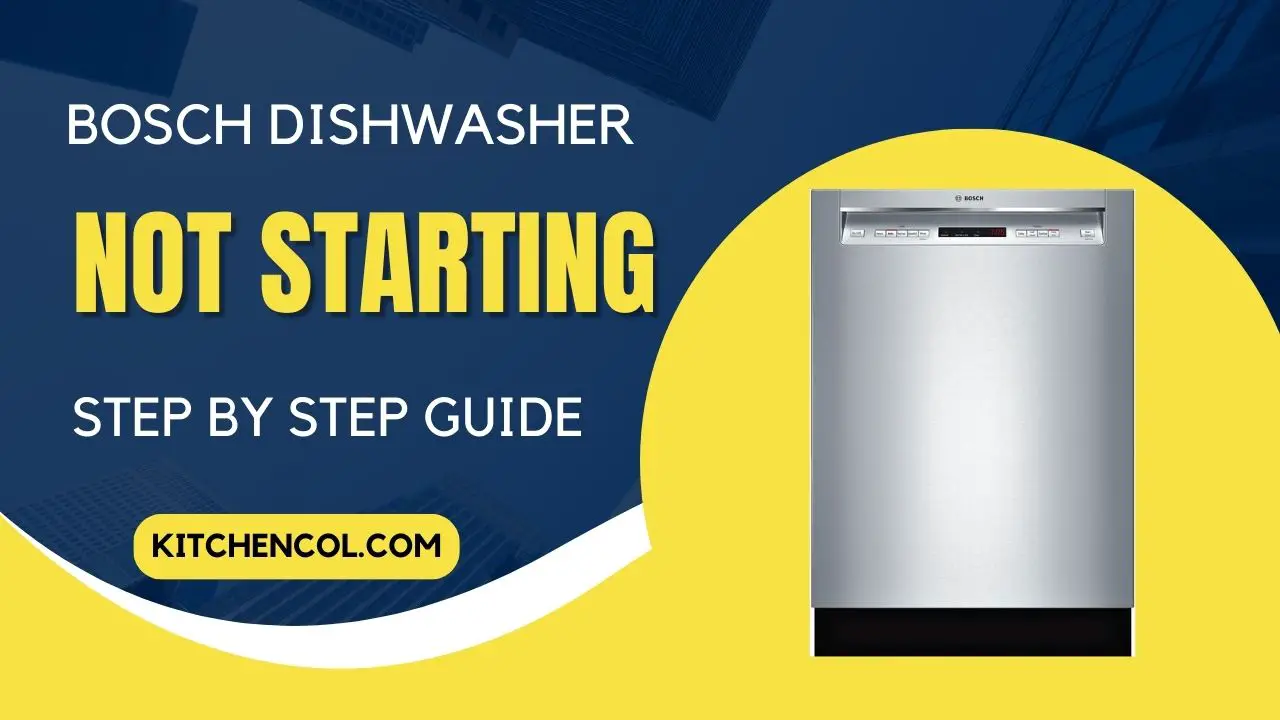Imagine you’re all set to tackle that mountain of dirty dishes after a sumptuous dinner, only to find that your Bosch dishwasher refuses to start. Frustrating, right? A malfunctioning dishwasher can throw a wrench into your daily routine but fear not – in this blog post, we’ll be your troubleshooting guide to resolve the issue of your Bosch dishwasher not starting.
We’ll walk you through common reasons for this problem and provide step-by-step solutions to get your trusty appliance back up and running efficiently. Let’s dive in and get those dishes sparkling clean once again!
Common Reasons Why Your Bosch Dishwasher Isn’t Starting
Your Bosch dishwasher is a modern marvel designed to make your life easier, but when it refuses to start, it can be a major inconvenience. Fortunately, many of the reasons behind this issue are easily diagnosable and fixable. Here are some common culprits:
Power Supply Issues:
- Power Outage: Check if there’s a power outage in your area. Sometimes, the problem is external.
- Plug and Outlet: Ensure that the dishwasher is properly plugged in and the outlet is functioning. Loose connections can disrupt the power supply.
 DO Not Properly Closed:
DO Not Properly Closed:
- A Bosch dishwasher won’t start unless the door is securely closed. Even a slight gap can prevent it from initiating the cycle.
- Make sure nothing is obstructing the door’s closure, and try closing it firmly.
Faulty Control Panel:
- Your dishwasher may not start if the control panel is acting up.
- Look for error codes or unusual lights on the control panel. Attempt to reset it as per the user manual.
Water Supply Problems:
- Bosch dishwashers require a consistent water supply to operate. Any issues with water flow can halt the cycle.
- Check to see if the water inlet valve is broken or clogged. Inspect the water supply line for kinks or blockages.
Clogged Filters and Sprayer Arms:
- Dirty filters and clogged sprayer arms can hinder water circulation, affecting the dishwasher’s performance.
- Regularly clean or replace filters and ensure sprayer arms are free from debris.
By identifying and addressing these common issues, you can often restore your Bosch dishwasher to its optimal working condition. In the following sections, we’ll delve into troubleshooting steps for each of these problems, so you can get back to enjoying the convenience of a fully functional dishwasher.
Troubleshooting Steps
Now that we’ve identified common reasons why your Bosch dishwasher may not be starting, let’s dive into the troubleshooting steps to help you get it back on track. Follow these steps carefully to pinpoint and resolve the issue:
Check the Power Supply:
- Ensure there’s no power outage in your area by testing other appliances.
- Make sure the dishwasher is safely plugged in.
- If the dishwasher is plugged into a GFCI outlet, make sure it hasn’t tripped.
Ensure Proper Door Closure:
- Examine the dishwasher door for any obstructions or debris that may be preventing it from closing properly.
- Close the door firmly, making sure it latches securely. A door that’s not fully closed will prevent the cycle from starting.
Inspect the Control Panel:
- Check the control panel for any error codes or unusual lights.
- Consult your dishwasher’s manual for instructions on how to reset the control panel if needed.
- Try turning the dishwasher off and on again to reset the control system.
Examine the Water Supply:
- Shut off the dishwasher’s water supply valve and disconnect the water supply line.
- Inspect the water inlet valve for clogs or damage. Clean or replace it if necessary.
- Reconnect the water supply line, ensuring it’s not kinked, and turn on the water supply.
Clean or Replace Filters and Sprayer Arms:
- Remove and clean the dishwasher’s filters according to the user manual.
- Check for any debris or food particles clogging the sprayer arms. Clean them thoroughly.
- Reassemble the filters and sprayer arms, ensuring they are properly seated.
Additional Troubleshooting Tips:
- If the issue persists, consult your Bosch dishwasher’s user manual for specific troubleshooting instructions.
- Try running a short diagnostic or test cycle if your dishwasher has this feature.
- If you’re uncertain about any steps or if the problem remains unresolved, consider contacting Bosch customer support or a professional technician for assistance.
By systematically going through these troubleshooting steps, you’ll increase your chances of identifying and resolving the issue preventing your Bosch dishwasher from starting. Remember to exercise caution when working with electrical and water connections, and consult your dishwasher’s manual for model-specific guidance.
When to Seek Professional Help
Seeking professional help for your Bosch dishwasher is essential when certain conditions are met:
- Persistent Issues: If you’ve diligently followed the troubleshooting steps and your dishwasher still refuses to start, it’s time to call in a professional. Repeated attempts to fix the problem without success can lead to further damage or safety hazards.
- Error Codes: If your dishwasher displays error codes that you can’t resolve on your own, it’s a clear sign to seek professional assistance. These codes often indicate specific issues that require expert diagnosis and repair.
- Electrical or Plumbing Expertise Required: When problems involve complex electrical or plumbing components, it’s best to leave the repairs to professionals. Attempting to fix these issues without the necessary expertise can be dangerous and may void your warranty.
- Warranty Considerations: If your dishwasher is still under warranty, attempting DIY repairs might void that warranty. It’s advisable to consult the manufacturer’s warranty terms and conditions before taking any action.
- Unusual Noises or Smells: Unusual sounds or odors emanating from your dishwasher can indicate underlying issues that a technician should investigate to prevent further damage.
In such cases, contacting Bosch customer support or a certified technician is a prudent step. They possess the knowledge, tools, and experience to accurately diagnose and repair complex dishwasher problems, ensuring your appliance operates safely and efficiently.
Preventative Maintenance Tips
Preventing issues with your Bosch dishwasher is often easier and more cost effective than dealing with repairs. Here are some proactive steps you can take to ensure your dishwasher remains in excellent working condition:
Regular Cleaning:
- Clean the dishwasher’s interior, including the door gasket, spray arms, and filter, on a monthly basis. This prevents the buildup of food debris, soap scum, and mineral deposits.
Use Recommended Detergents:
- Use high-quality dishwasher detergents recommended by Bosch. Dishwasher damage can result from using normal dish soap, which can produce excessive suds.
Proper Loading:
- Load dishes correctly, ensuring that they don’t block the spray arms and that there’s adequate space between items. For loading instructions, consult the user manual for your dishwasher.
Regularly Check for Leaks:
- Inspect the area around the dishwasher for any signs of leaks, such as water on the floor. Leaks should be fixed as a way to avoid water damage.
Maintain the Water Supply:
- Periodically check the water supply line for leaks, kinks, or blockages. Ensure the water inlet valve is functioning correctly.
Inspect the Drain:
- Check the dishwasher’s drain filter for debris. Ensure that the drain hose is properly installed and not obstructed.
Avoid Overloading:
- Don’t overload the dishwasher with too many dishes. Overloading can hinder proper water circulation and result in subpar cleaning.
Regularly Test Functions:
- Run test cycles or short dishwasher cycles to ensure all functions are working correctly. This helps identify issues early on.
Maintain Dishwasher Exterior:
- Wipe down the exterior of the dishwasher regularly to prevent the accumulation of dirt and grime. For cleaning, use a moist towel and a moderate detergent.
Service Check:
Schedule periodic professional maintenance checks, especially if your dishwasher is out of warranty. A technician can perform thorough inspections and address any potential issues before they become major problems.
By following these preventative maintenance tips, you can prolong the life of your Bosch dishwasher and ensure it operates at peak efficiency, saving you both time and money in the long run. Remember that proper care and maintenance are key to a trouble-free dishwasher experience.
Also Read: Why is it Necessary to Clean Vent Hoods-DIY Guide
Conclusion
A Bosch dishwasher not starting can be a frustrating hiccup in your daily routine, but with the right knowledge and troubleshooting steps, you can often resolve the issue without much hassle. By addressing common problems like power supply issues, door closure, control panel malfunctions, water supply problems, and clogged filters, you can breathe new life into your dishwasher.
Remember, maintenance is your appliance’s best friend. Regular cleaning, using recommended detergents, and proper loading techniques can go a long way in preventing future issues. However, if problems persist or if you encounter error codes beyond your understanding, don’t hesitate to seek professional help.
Your Bosch dishwasher is a reliable kitchen companion, capable of handling the daily chore of dishwashing efficiently. With the right care, it will continue to serve you well for years to come, making your life more convenient and leaving you with sparkling clean dishes after every cycle. So, don’t let a minor hiccup deter you – follow these tips, troubleshoot, and enjoy the convenience of your fully operational dishwasher.

My name is Manan Bukhari and I am an expert in reviewing kitchen products for years. I have a passion for testing multiple gadgets especially related to home & kitchen. I love to spend my free time in resolving issues if I face some in any of my daily use things. I have fixed multiple gadgets of my home on my own without any assistance and that thing gave me confidence to make a blog on troubleshooting of items that are for daily use to assist you folks. Even my wife praises me for having such talent. I always explore new machines on my own because this thing fascinates me.
 DO Not Properly Closed:
DO Not Properly Closed:


